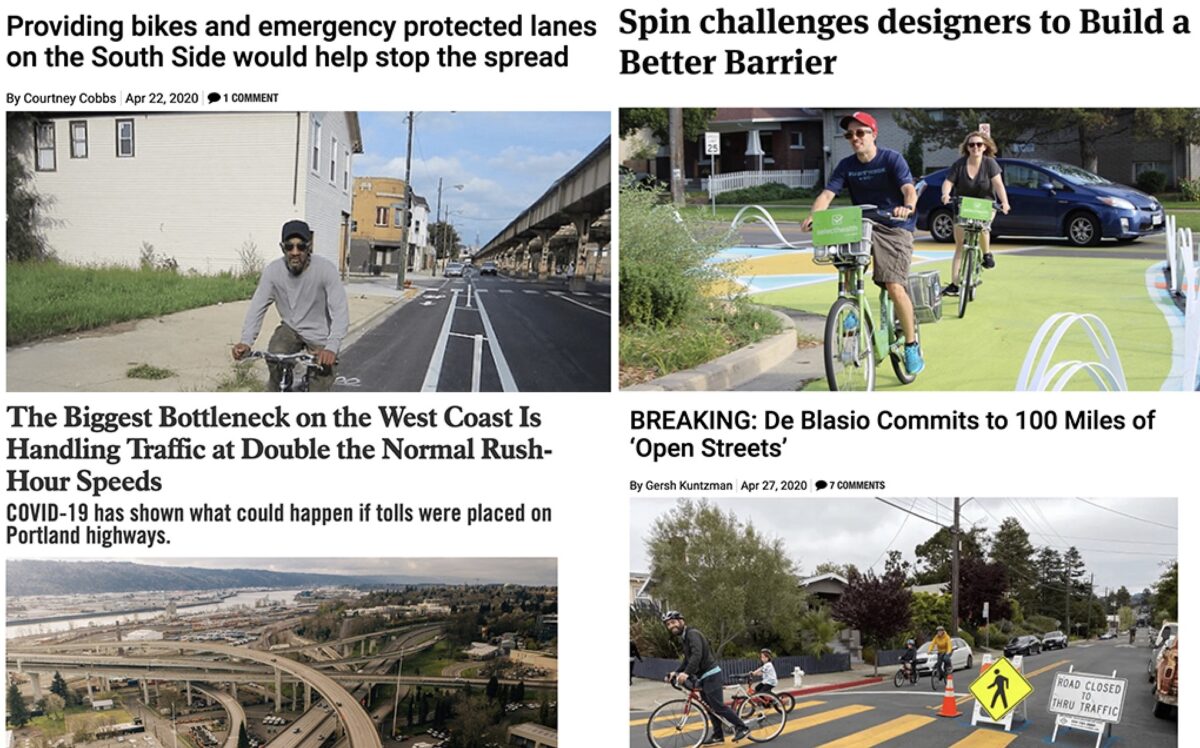This week’s Monday Roundup is sponsored by Western Bikeworks, the local source for all your riding needs!
Welcome to the week. Here are the most notable items our community came across in the past seven days…
As Portland leaders continue to sit on their hands and do nothing to adapt our streets to new mobility realities, a host of cities moved aggressively forward in the past week. Here’s a roundup:
Washington D.C.: Many people in Portland seem to think a massive open streets plan is the only thing we can do. That’s not the case at all. In D.C., they’ve decided to create temporary extended sidewalks adjacent to grocery stores so people have more room to queue.
Seattle: Our neighbors to the north are expanding their Stay Healthy Streets program with six more miles of roads where driving access will be limited in favor of walkers and bikers.
New York City: Once paired with Portland as a “progressive” big city that was responding feebly to the moment, NYC Bill de Blasio has finally seen the light and has committed to 100 miles of open streets.
Salt Lake City: Their “Stay Safe, Stay Active Streets” program has launched with a 1.3 mile stretch of road that will be open for bikers and walkers and can only be driven on by local traffic.
Milan: This Italian city never wants to go back to its polluted and car-dominated past and plans to “transform” 22 miles of streets in the coming months, “with a rapid, experimental citywide expansion of cycling and walking space to protect residents as Covid-19 restrictions are lifted.”
Paris: The capitol of France also wants to make sure bicycle riders are safe and their streets are healthy post-lockdown, so they’ve decided to create a whopping 650 kilometers of “pop-up cycleways”.
Advertisement
The political economy of car dependence: Seems like as good a time as any to bone up on new research about how the system creates car dependence and how we can break it.
Congestion relief: Turns out we can have a much more efficient and higher capacity freeway system at peak hours when we reduce demand — without spending $800 million on widening.
Father of ‘vehicular cycling’ dies: John Forester, author of Effective Cycling and the man who popularized “take the lane”, died at the age of 90. His impact on American cycling planning and culture was immense. Read an excellent and relatively recent interview with him here.
Know your history: Local architecture critic and writer Brian Libby shared a look back at the fight to turn Harbor Drive into Waterfront Park, 50 years after it happened.
Bikes FTW (again): Cycling proves its resilience yet again and experts in The Netherlands are among the many who think now is the moment to seize the streets and give cycling the space it deserves.
Barrier design: Micromobility company Spin has teamed up with Better Block for a design contest they hope will result in a better barrier to protect vulnerable road users from car drivers.
Clean air is possible: The research about air quality and links to Covid-19 deaths are striking.
Advertisement
The ‘plague’ of car culture: “Frankly, the idea that we can transport ourselves sustainably en masse in toxic 4,000-pound battering rams is just as delusional, entitled and self-destructive as the ‘liberate’ protestors who are demanding a premature end to coronavirus-related stay-at-home orders,” says this LA Times op-ed.
Commuting down: A Portland State University researcher tries to crunch the numbers to see if and how the lockdown has impacted bike-to-work rates.
Bikes are the new toilet paper: Bike sales are booming around the world, which is why industry types are joining urban planners in calls for safer streets for cycling.
Behind the scenes in Oakland: This interview with Warren Logan, City of Oakland mobility policy director, will either inspire you (if you’re still optimistic Portland will get its act together) or depress you (if you’re lamenting our stubborn inaction).
Give them bikes, but also a safe place to ride: Chicago advocate Courtney Cobbs says protected bike lanes and more bike parking are necessary so transit-dependent people can avoid Covid-19 exposure and hop on a bike.
— Jonathan Maus: (503) 706-8804, @jonathan_maus on Twitter and jonathan@bikeportland.org
— Get our headlines delivered to your inbox.
— Support this independent community media outlet with a one-time contribution or monthly subscription.


